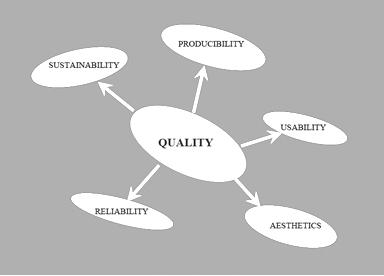In general terms, “quality” refers to the distinctive attributes of some phenomenon. The study of quality or value is systematised within the scientific discipline termed Axiology.
Purpose for defining quality is to establish a common concept that will contribute to improving our wellbeing.
Quality consists of usability, producibility, reliability, sustainability, and aesthetics.
(i) “Usability”: how much it satisfies a specific need, ‘a fitness for use’.
(ii) “Producibility”: how easy it can be produced, manufactured or gained otherwise, with the lowest possible resource consumption.
(iii) “Reliability”: for how long will be usable and maintainable at a specified level.
(iv) “Sustainability”: the ability to provide for the needs of the world's current population without damaging the ability of future generations to provide for themselves.
(v) "Aesthetics": how beautiful and pleasing it is to our senses and mind.
It appears that the terms (i) to (iv) listed above, can be quantified, at least to some useful extent; the fifth one cannot be quantified on the basis of an explicit knowledge. One strategy to satisfy this fifth criterion (v) is to manufacture a random variety of otherwise identical products at the same level of other four norms (i-iv). However, it stands that the randomness is not an intrinsic characteristics of beauty. The science of aesthetics provides certain knowledge about the sensori-emotional values, sometimes called judgments of sentiment and taste.
